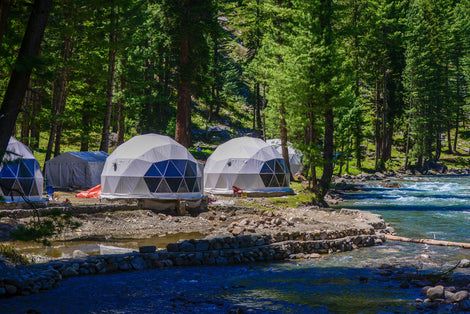Winter Water System Protection Methods
When winter rolls in, water systems can take a serious hit, especially on off-grid setups. Frozen lines, cracked pipes, and stuck pumps are the kinds of problems that can throw your daily routine out of sync. For anyone relying on solar-powered systems, a frozen water line doesn't just mean no water. It might mean no functioning power, no heat, and a whole lot of stress. Cold weather doesn't wait around, so it's smart to have your setup ready before things turn solid overnight.
The goals during a cold snap are pretty basic: keep the water flowing, protect your system from damage, and make sure everything keeps running off solar without surprise shutdowns. That means looking at your pipes, your power supply, and your water safety gear through a winter lens. The good news is, if you know what to look for, you can keep things smooth all season long, even when the temps bottom out.
Insulate And Protect Pipes
Frozen pipes can stop your water system in its tracks. If one pipe goes solid, it can block the flow, build pressure, and even burst. That can leave you with a plumbing mess and possibly water damage to clean up, not to mention the loss of access to everything from sinks to showers and well-fed filtration units.
Start by identifying every part of your water setup that's exposed to the cold. That usually includes:
- Above-ground intake pipes
- Connections between storage tanks and pumps
- Outdoor hose bibs
- Pipes running through unheated buildings or sheds
Once you've identified those areas, insulation becomes step one. There are several options, but focus on ones that are made to trap heat around small plumbing lines. Foam tube covers work well when pipes are easily accessible. For trickier areas, wraps made from rubber or fiberglass insulation can offer better coverage. In every case, seal up the ends so cold air doesn't sneak in.
For harsher winters or long cold snaps, you might need to add low-power heat sources. Heat tape or heated cables keep the pipes just warm enough to stop freezing. Self-regulating versions are better suited for solar setups, since they only draw power when it's cold.
It's also smart to cover external spigots and hose bibs. These spots freeze quickly and can be overlooked if they're not in use. Use insulated covers built for winter use and double check that any shut-off valves tied to them are flushed and dry.
Backup Power For Water Systems
Off-grid water systems depend on power as much as they do stable plumbing. When the sun goes away for days or snow covers your panels, your system's battery supply may struggle to keep up. A sudden power drop can shut down your pump, heater, or filtration system, and you don't want that when things are already frozen outside.
The best fix is to build a backup plan that works with your main solar kit. That usually includes a solar battery bank large enough to store extra energy for when winter limits your daily intake. If your system doesn't include battery storage yet, adding one can help cover winter power dips, especially if your water use stays consistent through the colder months.
Solar backup systems need more than just a battery. You'll also want to:
- Check the charge controller is working and rated for current temps
- Run periodic tests to see how long your stored energy lasts
- Keep snow brushed off panels regularly so charging is steady
- Protect your battery bank from freezing temps with proper housing or warm enclosures
Even with storage, it's smart to schedule short checks through the season. Look at water pump performance, charge levels, and fault warnings on your inverter. A drop in pressure or a lag in response could be signs your backup system is either low on power or not distributing correctly.
One homeowner had their main pump suddenly fail in the middle of a January storm. Turned out snow had blocked their southern-facing panels and drained the battery bank. Had they gotten an earlier alert or checked the levels the day before, they could have avoided the issue and kept the line running. A quick look once a week can save time and headaches later.
Preventing Water Source Contamination
Winter can sneak in issues with water quality when you least expect it. Ice, shifting soil, and exposed components can leave your system open to contamination. If your water comes from a well or natural source, cold weather can cause cracks in seals or push surface runoff into unseen gaps. When everything freezes up, detecting problems gets even harder.
The best long-term protection starts with a drinking water filtration system that works with your off-grid solar setup. These systems clean your water before it ever reaches a storage tank or enters your home. They're especially useful in the winter when extra debris or bacteria can sneak into your supply. A solar-compatible unit helps keep the purification process running. Just make sure it's connected to power backup if the main supply drops out for any reason.
Storage is another point to keep in mind. If you're holding water in barrels, tanks, or jugs to get through stretches where pumps might slow down, you'll need to store that water safely. Don't leave containers open to the air or use thin-walled plastic that can crack if the temperature drops fast.
Here's how to avoid winter-related water contamination:
- Install covers for outdoor tanks and inspect all caps and entry points
- Make sure your overflow pipes aren't blocked by ice or snow buildup
- Sanitize reusable containers before filling them for indoor use
- Keep stored drinking water in areas above freezing if possible
Letting water sit too long without protection or filtration can lead to odors or discoloration. If your water changes appearance or smell in cold weather, that's a good time to have it checked. Don't wait until you or someone else gets sick from it.
Regular System Checks And Maintenance
Water systems don't always give out with a bang. Sometimes things wear down slowly until they stop working at the worst moment. Doing regular checks during winter helps catch problems early and keep things running without disruption. When you're off-grid, the last thing you want is to lose access to water just because a small part failed where no one was looking.
These checks don't have to be complicated or technical. A visual inspection once a week can go a long way. Focus on areas where water moves or needs power to function. Think pump stations, inlet filters, line connectors, and pressure tanks. Watch for icicles, dripping water, or frosted parts that might lead to trouble if left alone.
Here's a quick checklist:
1. Scan pipes and tanks for frost, cracks, or signs of pressure buildup
2. Test pump output by running a faucet and noting water flow strength
3. Listen for odd noises from motors, valves, or your filtration system
4. Check panel voltages and inverter lights to catch early signs of power strain
5. Inspect the housing or shelter around your solar batteries and water gear
If you spot anything that's worn, lagging, or working harder than usual, don't wait. Cold weather puts strain on every part of the system. Even something small, like a stretched seal or low-pressure flow, can lead to bigger damage when the temps stay low for days at a time. Short checks help avoid longer outages or expensive repairs later.
Keep Your Water Flowing All Winter
Water systems don't need to stop working just because temperatures drop. With a few smart steps and steady attention, solar-powered setups can run strong all season long. It just takes staying ahead of the cold with planning, covers, and a trusted power supply that's ready when the sun isn't.
So whether you're deep in snow or just dealing with frosty mornings, making your system winter-ready now keeps everything easier later. You'll save energy, hold onto cleaner water, and reduce downtime. Plus, you won't have to start from scratch every time the forecast says freezing. Winter water protection isn't a one-time fix. It's an ongoing rhythm that keeps your home steady when the weather's anything but.
As the cold season sets in, ensure your off-grid water system keeps flowing smoothly all winter with the right precautions and equipment. Green Vista Living knows the importance of reliable solutions to maintain your comfort. Discover how an off grid solar power system kits can enhance your winter readiness by pairing it seamlessly with your water filtration needs. Stay ahead of freezing temperatures and protect your home from winter's harsh demands.







